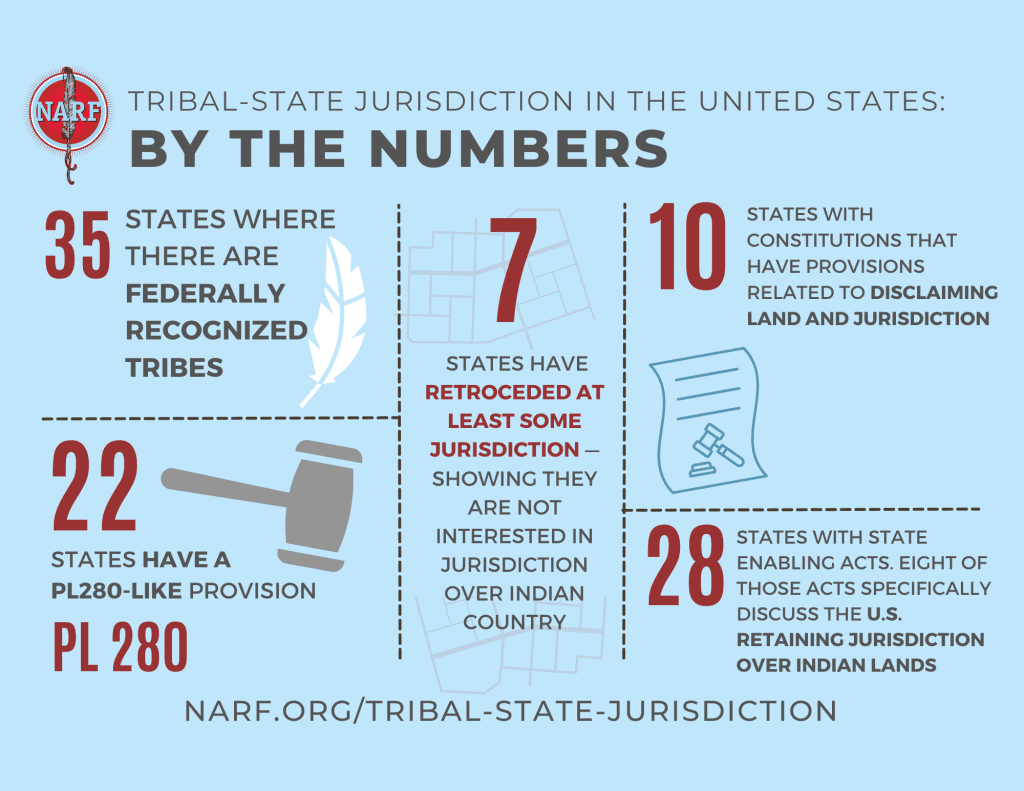State Constitutions, PL 280, and Enabling Acts
On June 29, 2022, the U.S. Supreme Court, in a 5-4 decision, overturned the long-held understanding that states do not have authority to prosecute non-Indians who commit crimes against Indians in Indian country. The Court, in Castro-Huerta v. Oklahoma, held that “the Federal Government and the State have concurrent jurisdiction to prosecute crimes committed by non-Indians against Indians in Indian country” which strikes against tribal sovereignty and jurisdiction to protect tribal citizens. The consequences of the decision–for tribal nations, the federal government, and states–will take time to unravel.
NARF has pulled together resources to better understand the landscape of state jurisdiction in Indian Country. Below highlights the 35 states where there are federally recognized tribes and information on their enabling acts, constitutions, and PL-280 provisions. We hope this survey proves useful to advocates in Indian Country.

| 35 STATES WITH TRIBES | PL-280 PROVISION | RETROCEDED JURISDICTION | CONSTITUTIONAL PROVISIONS | ENABLING ACTS | ENABLING ACTS SPECIFIC TO INDIAN LANDS |
|---|---|---|---|---|---|
| ALABAMA | 🟡 | ||||
| ALASKA | 🔴 | 🔵 | 🟡 | 🟣 | |
| ARIZONA | 🔴 | 🟢 | 🔵 | 🟡 | 🟣 |
| CALIFORNIA | 🔴 | 🔵 | 🟡 | ||
| COLORADO | 🔴 | 🔵 | 🟣 | ||
| CONNECTICUT | 🔴 | ||||
| FLORIDA | 🔴 | 🔵 | 🟡 | ||
| IDAHO | 🔴 | 🔵 | 🟡 | ||
| IOWA | 🔴 | 🟡 | |||
| KANSAS | 🔴 | 🟡 | 🟣 | ||
| LOUISIANA | 🟡 | ||||
| MAINE | 🔴 | 🟡 | |||
| MASSACHUSETTS | 🔴 | 🟡 | |||
| MICHIGAN | 🔵 | 🟡 | |||
| MINNESOTA | 🔴 | 🟢 | 🟡 | ||
| MISSISSIPPI | 🟡 | ||||
| MISSOURI | 🟡 | ||||
| MONTANA | 🔴 | 🟢 | 🔵 | 🟡 | |
| NEBRASKA | 🔴 | 🟢 | 🟡 | ||
| NEVADA | 🔴 | 🟢 | 🟡 | ||
| NEW MEXICO | 🔵 | 🟣 | |||
| NEW YORK | 🔴 | 🔵 | |||
| NORTH CAROLINA | |||||
| NORTH DAKOTA | 🟡 | 🟣 | |||
| OKLAHOMA | 🔵 | 🟡 | 🟣 | ||
| OREGON | 🔴 | 🟢 | 🟡 | ||
| RHODE ISLAND | 🔴 | ||||
| SOUTH CAROLINA | 🔴 | ||||
| SOUTH DAKOTA | 🔵 | 🟡 | 🟣 | ||
| TEXAS | 🔴 | 🟡 | |||
| UTAH | 🔴 | 🔵 | 🟡 | ||
| VIRGINIA | |||||
| WASHINGTON | 🔴 | 🟢 | 🔵 | 🟡 | 🟣 |
| WISCONSIN | 🔴 | 🟢 | |||
| WYOMING | 🔵 |
STATE GUIDES
Alabama

Federal State Enabling Act: 3 Stat 489; 3 Stat 608
The enabling act does not contain Indian jurisdiction provisions.
PL 280: None.
Constitution: Alabama constitution online.
Alaska

Federal State Enabling Act: 72 Stat 339 (P.L. 85-508)
Indian jurisdiction provisions: 72 Stat 339, Section 4.
PL 280: Yes. 18 U.S.C Section 1162
Each of the States or Territories listed in the following table shall have jurisdiction over offenses committed by or against Indians in the areas of Indian country listed opposite the name of the State or Territory to the same extent that such State or Territory has jurisdiction over offenses committed elsewhere within the State or Territory, and the criminal laws of such State or Territory shall have the same force and effect within such Indian country as they have elsewhere within the State or Territory.
- Exceptions: Yes.
Except that on Annette Islands, the Metlakatla Indian community may exercise jurisdiction over offenses committed by Indians in the same manner in which such jurisdiction may be exercised by Indian tribes in Indian country over which State jurisdiction has not been extended
- Retrocessions: None
Constitution: Alaska constitution online.
Arizona

Federal State Enabling Act: 36 Stat 557 (P.L. 61-219); 37 Stat 39; 37 Stat 1728
Indian jurisdiction provisions: 36 Stat 557 Section 2 (New Mexico), Section 20 (Arizona)
PL 280: Yes, state-specific law. Act of Sept 18, 1978, Pub. L. No 95-375, 92 Stat 712
That the State of Arizona shall exercise criminal and civil jurisdiction over such lands as if it had assumed jurisdiction pursuant to the Act of August 15,1953 (67 Stat. 588), as amended by the Act of April 11,1968 (82 Stat. 79).
- Exceptions: None.
- Retrocessions: Yes. Ariz. Proclamation of the Governor (Oct. 4, 1984); 50 Fed. Reg. 34555-01 (Aug. 26, 1985)
Arizona under Public Law 95-375 and Public Law 97-386 . . . except, however, that this retrocession shall not be construed to include the exercise of civil and criminal jurisdiction otherwise existing apart from the provisions of Public Law 95-375 and Public Law 97-386 over non-members of the Pascua Yaqui tribe within that part of Arizona which coincides with the areas of the Pascua Yaqui reservation nor shall this retrocession be construed to include the exercise of other civil and criminal jurisdiction existing separate and apart from jurisdiction contemplated under Public Law 95-375 and Public Law 97-386”.[1]
Constitution: Arizona constitution online.
California

Federal State Enabling Act: 9 Stat 452
It does not contain Indian jurisdiction provisions.
PL 280: Yes. 18 U.S.C § 1162
Each of the States or Territories listed in the following table shall have jurisdiction over offenses committed by or against Indians in the areas of Indian country listed opposite the name of the State or Territory to the same extent that such State or Territory has jurisdiction over offenses committed elsewhere within the State or Territory, and the criminal laws of such State or Territory shall have the same force and effect within such Indian country as they have elsewhere within the State or Territory
- Exceptions: None.
- Retrocessions: None.
Constitution: California constitution online.
Colorado

Federal State Enabling Act: 13 Stat 32; 18 Stat 474; 19 Stat 665
18 Stat 747 § 4 mentions Indian without reference to jurisdiction
Provided that the constitution shall be republican in form, and make no distinciton in civil or political rights on account of race or color, except Indians not taxed
PL 280: Yes, state-specific law. P.L 98-290 § 1-5, 98 Stat. 201, 202 (May 21, 1984)
Authorizing Town of Ignacio to exercise jurisdiction over Southern Ute Tribe
- Exceptions: None.
- Retrocessions: None.
Constitution: Colorado constitution online.
Reference to gaming in Colo. Const. art. 18, § 9 “(6) (e)
Nothing contained in this subsection (6) shall be construed to affect the authority granted upon the initial adoption of this section at the 1990 general election, or the conduct and regulation of gaming on Indian reservations pursuant to federal law.“
Connecticut

Federal State Enabling Act: None. Ratified the U.S. Constitution on January 9, 1788 becoming the fifth state.
PL 280: Yes. Land claim settlement acts:
- Mashantucket Pequot Indian Claims Settlement Act Pub. L. No. L 98-134, 94 Stat. 851
- Mohegan Nation of Connecticut Land Claims Settlement Act, P. L. 103–377, § 2, Oct. 19, 1994, 108 Stat. 3501, codified at, 25 U.S.C. § 1775 et seq.
- Exceptions: None.
- Retrocessions: None.
Constitution: Connecticut constitution online.
Florida

Federal State Enabling Act: 5 Stat 745; 5 Stat 789; 15 Stat 73 (P.L. 40-70)
It does not contain Indian jurisdiction provisions.
PL 280: Yes, PL 280-optional state. Also 25 U.S.C. § 1741 et seq.,
P.L. 97-399, § 7, Dec. 31, 1982, 96 Stat. 2015
Fla. Stat. 285.16
The State of Florida hereby assumes jurisdiction over criminal offenses committed by or against Indians or other persons within Indian reservations and over civil causes of actions between Indians or other persons or to which Indians or other persons are parties rising within Indian reservations. (2) The civil and criminal laws of Florida shall obtain on all Indian reservations in this state and shall be enforced in the same manner as elsewhere throughout the state.
- Exceptions: None.
- Retrocessions: None.
Constitution: Florida constitution online.
Reference to gaming/IGRA in Fla. Const. art. 10 § 30 (c)
…nothing herein shall be construed to limit the ability of the state or Native American tribes to negotiate gaming compacts pursuant to the Federal Indian Gaming Regulatory Act1 for the conduct of casino gambling on tribal lands, or to affect any existing gambling on tribal lands pursuant to compacts executed by the state and Native American tribes pursuant to IGRA.
Idaho

Federal State Enabling Act: 26 Stat 215
It does not contain Indian jurisdiction provisions
PL 280: Yes, PL 280.
Idaho Code § 67-5101 et seq.
Additional state jurisdiction in criminal and civil causes of action may be extended to particular reservations or Indian country with the consent of the governing body of the tribe occupying the Indian country effected [affected] by the assumption of such additional jurisdiction. This may be achieved by negotiation with the tribe or by unilateral action by the tribe. In every case the extent of such additional jurisdiction shall be determined by a resolution of the tribal governing body and become effective upon the tribe’s transmittal of the resolution to the attorney general of the state of Idaho. Such resolution may effectively accept jurisdiction as to any particular field of criminal or civil jurisdiction. All state jurisdiction extended by virtue of this act shall be concurrent (and not exclusive) with jurisdiction in the same matters existing in the tribes or the federal government.
- Exceptions: Tribes that did not consent are not covered.
- Retrocessions: None.
Constitution: Idaho constitution online.
Idaho Const. art. XXI, § 19
And the people of the state of Idaho do agree and declare that we forever disclaim all right and title to the unappropriated public lands lying within the boundaries thereof, and to all lands lying within said limits owned or held by any Indians or Indian tribes; and until the title thereto shall have been extinguished by the United States, the same shall be subject to the disposition of the United States, and said Indian lands shall remain under the absolute jurisdiction and control of the congress of the United States;
Iowa

Federal State Enabling Act: 5 Stat 742; 5 Stat 789; 9 Stat 52; 9 Stat 117
It does not contain Indian jurisdiction provisions.
PL 280: Yes, PL 280-optional state.
Iowa Code Ann. §§ 1.12 -1.14 (62 G.A. Ch. 79, § 1, eff. July 1, 1967, accepting civil jurisdiction over reservation pursuant to Public Law 280)
- Exceptions: None.
- Retrocessions: None.
Constitution: Iowa constitution online.
Kansas

Federal State Enabling Act: Yes. 12 Stat 126
PL 280: Yes, state specific law. 18 U.S.C. § 3243 (conferring state criminal jurisdiction over reservations)
Jurisdiction is conferred on the State of Kansas over offenses committed by or against Indians on Indian reservations, including trust or restricted allotments, within the State of Kansas, to the same extent as its courts have jurisdiction over offenses committed elsewhere within the State in accordance with the laws of the State.
- Exceptions: None.
- Retrocessions: None.
Constitution: Kansas constitution online.
Louisiana

Federal State Enabling Act: 2 Stat 641; 2 Stat 701
It does not contain Indian jurisdiction provisions.
PL 280: None.
- Exceptions: None
- Retrocessions: None
Constitution: Louisiana constitution online.
Maine

Federal State Enabling Act: 3 Stat. 544
It does not contain Indian jurisdiction provisions.
PL 280: Yes, state-specific law. Also Aroostook Band of Micmancs Settlement Act, P.L. 102-171, 105 Stat. 1143, Nov. 26, 1991
Maine Indian Claims Settlement Act, Pub. L. No. 96-420, 94 Stat. 1785
Except as provided in section 8(e) and section 5(d)(4), all Indians, Indian nations, or tribes or bands of Indians in the State of Maine, other than the Passamaquoddy Tribe, the Penobscot Nation, and their members, and any lands or natural resources owned by any such Indian, Indian nation, tribe or band of Indians and any lands or natural resources held in trust by the United States, or by any other person or entity, for any such Indian, Indian nation, tribe, or band of Indians shall be subject to the civil and criminal jurisdiction of the State, the laws of the State, and the civil and criminal jurisdiction of the courts of the State, to the same extent as any other person or land therein.
- Exceptions: None.
- Retrocessions: None.
Constitution: Maine constitution online.
Massachusetts

Federal State Enabling Act: None. Ratified the U.S. Constitution on February 6, 1788, becoming the sixth state.
PL 280: Yes, state-specific law. Massachusetts Indian Land Claims Settlement Act, P.L. 100-95, 101 Stat. 704, Aug. 18, 1987, codified at 25 U.S.C. § 1771 et seq.
The Wampanoag Tribal Council of Gay Head, Inc., shall not have any jurisdiction over nontribal members and shall not exercise any jurisdiction over any part of the settlement lands in contravention of this Act, the civil regulatory and criminal laws of the Commonwealth of Massachusetts, the town of Gay Head, Massachusetts, and applicable Federal laws.
- Exceptions: Only applies to Wampanoag.
- Retrocessions: None.
Constitution: Massachusetts constitution online.
Michigan

Federal State Enabling Act: Yes. 5 Stat. 144
It does not contain Indian jurisdiction provisions.
PL 280: None.
- Exceptions: None
- Retrocessions: None
Constitution: Michigan constitution online.
Reference to Indian gaming in Mich. Const. art. 4, § 41
This section shall not apply to gambling in up to three casinos in the City of Detroit or to Indian tribal gaming.
Minnesota

Federal State Enabling Act: Yes. 11 Stat. 285
It does not contain Indian jurisdiction provisions.
PL 280: Yes, PL 280. 18 U.S.C. § 1162
Each of the States or Territories listed in the following table shall have jurisdiction over offenses committed by or against Indians in the areas of Indian country listed opposite the name of the State or Territory to the same extent that such State or Territory has jurisdiction over offenses committed elsewhere within the State or Territory, and the criminal laws of such State or Territory shall have the same force and effect within such Indian country as they have elsewhere within the State or Territory
- Exceptions: All Indian country within the state, except the Red Lake Reservation.
- Retrocessions: Yes. Act of May 23, 1973, Ch. 625, 1973 Minn. Laws 1500; Acceptance of Retrocession of Jurisdiction, 40 Fed. Reg. 4026 (Jan. 27, 1975).
The state of Minnesota hereby retrocedes to the United States all jurisdiction over criminal offenses committed by or against Indians in the area of Indian country known as Bois Forte Reservation, in St. Louis and Koochiching counties, Minnesota.
Constitution: Michigan constitution online.
Mississippi

Federal State Enabling Act: Yes. 3 Stat 472
It does not contain Indian jurisdiction provisions.
PL 280: None.
- Exceptions: None.
- Retrocessions: None.
Constitution: Mississippi constitution online.
Missouri

Federal State Enabling Act: Yes. 3 Stat 645
It does not contain Indian jurisdiction provisions.
PL 280: None.
- Exceptions: None.
- Retrocessions: None.
Constitution: Missouri constitution online.
Montana

Federal State Enabling Act: Yes. Presidential Proclamation – 293
PL 280: Yes, PL 280-optional (affects one tribe, complicated)
Mont. Code Ann. §§ 2-1-302 to 2-1-307 (as of 1963, assuming criminal jurisdiction over Salish/Kootenai Reservation and over any other tribe with consent, but none consented)
Whenever the governor of this state receives from the tribal council or other governing body of the Confederated Salish and Kootenai Indian tribes or any other community, band, or group of Indians in this state, a resolution expressing its desire that its people and lands be subject to the criminal or civil jurisdiction, or both, of the state to the extent authorized by federal law and regulation, the governor shall issue within 60 days a proclamation to the effect that the specified jurisdiction applies to those Indians and their territory or reservation in accordance with the provisions of this part.
- Exceptions: Only with consent.
- Retrocessions: Yes, partial. 60 Fed. Reg. 33,318. Proclamation by the Governor for the State of Montana on September 30, 1994
Constitution: Montana constitution online.
- Mont. Const. art. 1
All provisions of the enabling act of Congress (approved February 22, 1889, 25 Stat. 676), as amended and of Ordinance No. 1, appended to the Constitution of the state of Montana and approved February 22, 1889, including the agreement and declaration that all lands owned or held by any Indian or Indian tribes shall remain under the absolute jurisdiction and control of the congress of the United States, continue in full force and effect until revoked by the consent of the United States and the people of Montana.
- Reference to education of American Indians in art. 10 § 1 (2)
Nebraska

Federal State Enabling Act: Yes. 14 Stat. 391
It does not contain Indian jurisdicition provisions.
PL 280: Yes, PL 280. 18 U.S.C. § 1162
Each of the States or Territories listed in the following table shall have jurisdiction over offenses committed by or against Indians in the areas of Indian country listed opposite the name of the State or Territory to the same extent that such State or Territory has jurisdiction over offenses committed elsewhere within the State or Territory, and the criminal laws of such State or Territory shall have the same force and effect within such Indian country as they have elsewhere within the State or Territory
- Exceptions: None.
- Retrocessions: Yes. Neb. Legislative Resolution 37, 80th Legislature (1969); 35 Fed. Reg. 16598-03 (Oct. 24, 1970); Neb. Legislative Resolution 57, 89th Legislature (1986); 51 Fed. Reg. 24234-01 (July 2nd, 1986); Neb. Legislative Resolution 17, 97th Legislature (2001); 71 Fed. Reg. 7994 (Feb. 15, 2006).
Constitution: Nebraska constitution online.
Nevada

Federal State Enabling Act: Yes. 13 Stat 30
It does not contain Indian jurisdiction provisions.
PL 280: Yes (PL 280 Optional State); 25 U.S.C. § 983 et seq (Recognizing Ponca tribe)
- Exceptions: None
- Retrocessions: Yes, full. 40 Fed. Reg. 27,501 (June 30, 1975). Need governors letter.
Constitution: Nevada constitution online.
New Mexico

Federal State Enabling Act: Yes. 36 Stat 557 (P.L. 61-219); 37 Stat. 39; 37 Stat. 1723
It does contain Indian jurisdiction provisions: 36 Stat 557 §§ 2 (New Mexico), § 20 (Arizona)
PL 280: None.
Other Federal Legislation: Pueblo Land Act Amendments of 2005
SEC. 20. CRIMINAL JURISDICTION
(a) In General—Except as otherwise provided by Congress, jurisdiction over offenses committed anywhere within the exterior boundaries of any grant from a prior sovereign, as confirmed by Congress or the Court of Private Land Claims to a Pueblo Indian tribe of New Mexico, shall be as provided in this section.
(b) Jurisdiction of the Pueblo—The Pueblo has jurisdiction, as an act of the Pueblos’ inherent power as an Indian tribe, over any offense committed by a member of the Pueblo or an Indian as defined in title 25, sections 1301(2) and 1301(4), or by any other Indian-owned entity.
(c) Jurisdiction of the United States—The United States has jurisdiction over any offense described in chapter 53 of title 18, United States Code, committed by or against an Indian as defined in title 25, sections 1301(2) and 1301(4) or any Indian owned entity, or that involves any Indian property or interest.
(d) Jurisdiction of the State of New Mexico—The State of New Mexico shall have jurisdiction over any offense committed by a person who is not a member of a Pueblo or an Indian as defined in title 25, sections 1301(2) and 1301(4), which offense is not subject to the jurisdiction of the United States.
Constitution: Yes. New Mexico constitution online.
N.M. Const. art. 21, § 8
Whenever hereafter any of the lands contained within Indian reservations or allotments in this state shall be allotted, sold, reserved or otherwise disposed of, they shall be subject for a period of twenty-five years after such allotment, sale, reservation or other disposal, to all the laws of the United States prohibiting the introduction of liquor into the Indian country; and the terms “Indian” and “Indian country” shall include the Pueblo Indians of New Mexico and the lands owned or occupied by them on the twentieth day of June, nineteen hundred and ten, or which are occupied by them at the time of the admission of New Mexico as a state.
- N.M. Const. art. 21, § 2
The people inhabiting this state do agree and declare that they forever disclaim all right and title to the unappropriated and ungranted public lands lying within the boundaries thereof, and to all lands lying within said boundaries owned or held by any Indian or Indian tribes, the right or title to which shall have been acquired through the United States, or any prior sovereignty; and that until the title of such Indian or Indian tribes shall have been extinguished the same shall be and remain subject to the disposition and under the absolute jurisdiction and control of the congress of the United States; and that the lands and other property belonging to citizens of the United States residing without this state shall never be taxed at a higher rate than the lands and other property belonging to residents thereof; that no taxes shall be imposed by this state upon lands or property therein belonging to or which may hereafter be acquired by the United States or reserved for its use; but nothing herein shall preclude this state from taxing as other lands and property are taxed, any lands and other property outside of an Indian reservation, owned or held by any Indian, save and except such lands as have been granted or acquired as aforesaid, or as may be granted or confirmed to any Indian or Indians under any act of congress; but all such lands shall be exempt from taxation by this state so long and to such extent as the congress of the United States has prescribed or may hereafter prescribe.
- Taxation reference in art. 8, § 3
New York

Federal State Enabling Act: Ratified the U.S. Constitution on July 26, 1788, becoming the 11th state.
It does not contain Indian jurisdiction provisions.
PL 280: Yes, state specific. 25 U.S.C. § 232 (civil); 25 U.S.C. § 233 (criminal)
The State of New York shall have jurisdiction over offenses committed by or against Indians on Indian reservations within the State of New York to the same extent as the courts of the State have jurisdiction over offenses committed elsewhere within the State as defined by the laws of the State
- Exceptions: None.
- Retrocessions: None.
Constitution: New York constitution online.
- Section 13, which dealt with purchase of lands of Indians, was repealed by amendment approved by vote of the people November 6, 1962.
- N.Y. Const. art. 6, § 31
This article does not apply to the peacemakers courts or other Indian courts, the existence and operation of which shall continue as may be provided by law.
North Carolina

Federal State Enabling Act: Ratified the U.S. Constitution on November 21, 1789, becoming the 12th state.
It does not contain Indian jurisdiction provisions.
PL 280: None.
Constitution: North Carolina constitution online.
North Dakota

Federal State Enabling Act: Yes. 25 Stat. 676
“That the people inhabiting said proposed States do agree and declare that they forever disclaim all right and title to the unappropriated public lands lying within the boundaries thereof, and to all lands lying within said limits owned or held by any Indian or Indian tribes; and that until the title thereto shall have been extinguished by the United States, the same shall be and remain subject to the disposition of the United States, and said Indian lands shall remain under the absolute jurisdiction and control of the Congress of the United States” [on file with NARF]
PL 280: No (state specific attempt)
Act of May 31, 1946, 60 Stat. 229 (conferring state criminal jurisdiction over Devil’s Lake, now Spirit Lake, reservation)
- Exceptions: None
- Retrocessions: None
Constitution: North Dakota constitution online.
Oklahoma

Federal State Enabling Act: Yes. 34 Stat. 267
It does contain Indian jurisdiction provisions.
… or to limit or affect the authority of the Government of the United States to make any law or regulation respecting such Indians, their lands, property, or other rights by treaties, agreement, law, or otherwise, which it would have been competent to make if this Act had never been passed.
the same [Indian land] shall be and remain subject to the jurisdiction, disposal, and control of the United States.
PL 280: None.
Constitution: Oklahoma constitution online.
- Okla. Const. art. 1, § 3
The people inhabiting the State do agree and declare that they forever disclaim all right and title in or to any unappropriated public lands lying within the boundaries thereof, and to all lands lying within said limits owned or held by any Indian, tribe, or nation; and that until the title to any such public land shall have been extinguished by the United States, the same shall be and remain subject to the jurisdiction, disposal, and control of the United States. Land belonging to citizens of the United States residing without the limits of the State shall never be taxed at a higher rate than the land belonging to residents thereof. No taxes shall be imposed by the State on lands or property belonging to or which may hereafter be purchased by the United States or reserved for its use.
- property taxes for Osage Indian Reservation in Sched. § 31; art. 10 § 6 A
…shall be exempt from taxation, and such property as may be exempt by reason of treaty stipulations, existing between the Indians and the United States government, or by federal laws, during the force and effect of such treaties or federal laws.”; Sched. § 31 Should be Section 33 of Preamble?”All attorneys-at-law licensed to practice in any court of record of the Territory of Oklahoma, or in any of the United States Courts for the Indian Territory, or any court of record of any of the Five Civilized Tribes, shall be eligible to practice in any court of the State without examination.
- art. 16 § 2
The State of Oklahoma hereby accepts all reservations and lands for public highways made under any grant, agreement, treaty, or act of Congress: Provided, This section shall not be construed to prejudice the vested rights of any tribe, allottee, or other person to any such land.
- Sched. § 8
All judgments and records of deeds, mortgages, liens, and other instruments, filed or recorded, affecting the title to real and personal property in the Indian Territory and Osage Indian Reservation, are hereby made as effectual to impart notice and for all other purposes under the laws of the Territory of Oklahoma extended in force in the State, as they were under the laws heretofore in force in the Indian Territory and Osage Indian Reservation.
Oregon

Federal State Enabling Act: Yes. 11 Stat 383
It does not contain Indian jurisdiction provisions.
PL 280: Yes, PL 280 mandatory. 18 U.S.C. § 1162
Each of the States or Territories listed in the following table shall have jurisdiction over offenses committed by or against Indians in the areas of Indian country listed opposite the name of the State or Territory to the same extent that such State or Territory has jurisdiction over offenses committed elsewhere within the State or Territory, and the criminal laws of such State or Territory shall have the same force and effect within such Indian country as they have elsewhere within the State or Territory.
- Exceptions: All Indian Country within the state, except the Warm Springs Reservation.
- Retrocessions: Yes (full, 2 tribes). Burns Paiute: Or. Executive Order EO-80-8 (Feb. 22nd, 1979), on file with NARF; 44 Fed. Reg. 26169 (Apr. 25, 1979). Umatilla: Or. Executive Order EO-80-8 (1980); 46 Fed. Reg. 2195-02 (Dec. 16, 1980).
all civil and criminal jurisdiction conferred on the state of Oregon by [Public Law 280] over the Burns Paiute reservation
Constitution: Oregon constitution online.
Rhode Island

Federal State Enabling Act: Ratified the U.S. Constitution on May 29, 1790, becoming the 13th state.
It does not contain Indian Jurisdiction provisions.
PL 280: Yes, specific state law. Rhode Island Indian Claims Settlement Act 25 U.S.C. § 1701 et seq. (§1708 confers state civil and criminal jurisdiction)
Except as otherwise provided in this Act, the settlement lands shall be subject to the civil and criminal laws and jurisdiction of the State of Rhode Island.
- Exceptions: None
- Retrocessions: None
Constitution: Rhode Island constitution online.
South Carolina

Federal State Enabling Act: Ratified the U.S. Constitution on May 23, 1788 becoming the 8th state.
It does not contain Indian jurisdiction provisions.
PL 280: Yes, specific state law. Catawba Indian Tribe of South Carolina Land Claim Settlement Act 25 U.S.C. 941
EXTENT OF JURISDICTION.—This Act shall not be construed to empower the Tribe with special jurisdiction or to deprive the State of jurisdiction other than as expressly provided by this Act or by the State Act. The jurisdiction and governmental powers of the Tribe shall be solely those set forth in this Act and the State Act.” All matters pertaining to governance and regulation of the reservation (including environmental regulation and riparian rights) shall be governed by the terms and provisions 01 the Settlement Agreement and the State Act, including, but not limited to, section 17 of the Settlement Agreement and section 27-16-120 of the State Act, unless otherwise pro-vided in this Act.
- Exceptions: None.
- Retrocessions: None.
Constitution: South Carolina constitution online.
South Dakota

Federal State Enabling Act: Yes, 25 Stat. 676
It does contain Indian jurisdiction provisions.
That the people inhabiting said proposed States do agree and declare that they forever disclaim all right and title to the unappropriated public lands lying within the boundaries thereof, and to all lands lying within said limits owned or held by any Indian or Indian tribes; and that until the title thereto shall have been extinguished by the United States, the same shall be and remain subject to the disposition of the United States, and said Indian lands shall remain under the absolute jurisdiction and control of the Congress of the United States.
PL 280: No, state-specific attempt. S.D. Codified Laws §§ 1-1-12. [Not valid Rosebud Sioux Tribe v. State of South Dakota, 900 F.2d 1154 (1990)]
- Exceptions: None
- Retrocessions: None
Constitution: South Dakota constitution online.
S.D. Const. art. XXII (also labeled as S.D. Const. Art. 26, § 18)
Second. That we, the people inhabiting the state of South Dakota, do agree and declare that we forever disclaim all right and title to the unappropriated public lands lying within the boundary of South Dakota, and to all lands lying within said limits owned or held by any Indian or Indian tribes; and that until the title thereto shall have been extinguished by the United States, the same shall be and remain subject to the disposition of the United States; and said Indian lands shall remain under the absolute jurisdiction and control of the Congress of the United States; that the lands belonging to citizens of the United States residing without the said state shall never be taxed at a higher rate than the lands belonging to residents of this state; that no taxes shall be imposed by the state of South Dakota on lands or property therein belonging to or which may hereafter be purchased by the United States, or reserved for its use. But nothing herein shall preclude the state of South Dakota from taxing as other lands are taxed any lands owned or held by any Indian who has severed his tribal relation and has obtained from the United States, or from any person a title thereto by patent or other grant save and except such lands as have been or may be granted to any Indian or Indians under any act of Congress containing a provision exempting the lands thus granted from taxation. All such lands which may have been exempted by any grant or law of the United States, shall remain exempt to the extent, and as prescribed by such act of Congress.
Texas

Federal State Enabling Act: Yes. 9 Stat. 108
It does not contain Indian jurisdiction provisions.
PL 280: Yes, state-specific laws. Alabama and Coushatta Tribes of Texas Restoration Act of 1987, 101 Stat. 666; Ysleta del Sur Pueblo Restoration Act of 1987; Texas Band of Kickapoo Act of 1983, 96 Stat. 2269
Ysleta del Sur Pueblo and the Alabama and Coushatta Indian Tribes of Texas: “The State shall exercise civil and criminal jurisdiction within the boundaries of the reservation as if such State had assumed such jurisdiction with the consent of the tribe under sections 401 and 402 of the Act entitled “An Act to prescribe penalties for certain acts of violence or intimidation, and for other purposes.”;
Texas Band of Kickapoo Indians: “The State of Texas shall exercise jurisdiction over civil causes of action and criminal offenses arising on the Band’s trust lands in accordance with section 1360 of title 28, United States Code, and section 1162 of title 18, United States Code, as if it had assumed jurisdiction pursuant to sections 401 and 402 of the Act of April 11, 1968 (82 Stat. 78, 79). // 25 USC 1321, 1322.
- Exceptions: None.
- Retrocessions: None.
Constitution: Texas constitution online.
Utah

Federal State Enabling Act: Yes. 28 Stat. 107
It does contain Indian jurisdiction provisions.
…and said Indian lands shall remain under the absolute jurisdiction and control of the Congress of the United States…
PL 280: Yes, PL 280. State passed without tribal consent, Utah Code Ann. §9-9-201 et seq. (2022)
The state of Utah hereby obligates and binds itself to assume criminal and civil jurisdiction over Indians and Indian territory, country, and lands or any portion thereof within this state in accordance with the consent of the United States given by the Act of Congress of April 11, 1968, 82 Stat. 78-80 (Public Law 284, 90th Congress), to the extent authorized by that act and this chapter.
- Exceptions: None.
- Retrocessions: None.
Constitution: Utah constitution online.
Utah Const. art. 3
Second:–The people inhabiting this State do affirm and declare that they forever disclaim all right and title to the unappropriated public lands lying within the boundaries hereof, and to all lands lying within said limits owned or held by any Indian or Indian tribes, and that until the title thereto shall have been extinguished by the United States, the same shall be and remain subject to the disposition of the United States, and said Indian lands shall remain under the absolute jurisdiction and control of the Congress of the United States. The lands belonging to citizens of the United States, residing without this State shall never be taxed at a higher rate than the lands belonging to residents of this State; but nothing in this ordinance shall preclude this state from taxing, as other lands are taxed, any lands owned or held by any Indian who has severed his tribal relations, and has obtained from the United States or from any person, by patent or other grant, a title thereto, save and except such lands as have been or may be granted to any Indian or Indians under any act of Congress, containing a provision exempting the lands thus granted from taxation, which last mentioned lands shall be exempt from taxation so long, and to such extent, as is or may be provided in the act of Congress granting the same.
Virginia

Federal State Enabling Act: Ratified the U.S. Constitution on June 25, 1788, becoming the tenth state.
PL 280: None.
Constitution: Virginia constitution online.
Washington

Federal State Enabling Act: Yes. 25 Stat. 676
It does contain Indian Jurisdiction provisions.
That the people inhabiting said proposed States do agree and declare that they forever disclaim all right and title to the unappropriated public lands lying within the boundaries thereof, and to all lands lying within said limits owned or held by any Indian or Indian tribes; and that until the title thereto shall have been extinguished by the United States, the same shall be and remain subject to the disposition of the United States, and said Indian lands shall remain under the absolute jurisdiction and control of the Congress of the United States
PL 280: Yes, PL 280-optional state. An Act Relating to State Jurisdiction Over Indians, Reservations, and Other Lands, Ch. 36, 1963 Wash. Sess. Laws 346. RCW 37.12.010
- Exceptions: Yes, only applies with tribal consent.
Whenever the governor of this state shall receive from the majority of any tribe or the tribal council or other governing body, duly recognized by the Bureau of Indian Affairs, of any Indian tribe, community, band, or group in this state a resolution expressing its desire that its people and lands be subject to the criminal or civil jurisdiction of the state of Washington to the full extent authorized by federal law, he or she shall issue within sixty days a proclamation to the effect that such jurisdiction shall apply to all Indians and all Indian territory, reservations, country, and lands of the Indian body involved to the same extent that this state exercises civil and criminal jurisdiction or both elsewhere within the state”
- Retrocessions: Yes, partial to eight tribes. Quinault, Suquamish, Colville Confederated Tribes, Swinomish Tribe, Quileute Tribe, Chehalis Tribe, Tulalip Tribe, Yakama Tribe
Constitution: Washington constitution online.
Wash. Const. art. 26
Second. That the people inhabiting this state do agree and declare that they forever disclaim all right and title to the unappropriated public lands lying within the boundaries of this state, and to all lands lying within said limits owned or held by any Indian or Indian tribes; and that until the title thereto shall have been extinguished by the United States, the same shall be and remain subject to the disposition of the United States, and said Indian lands shall remain under the absolute jurisdiction and control of the congress of the United States and that the lands belonging to citizens of the United States residing without the limits of this state shall never be taxed at a higher rate than the lands belonging to residents thereof; and that no taxes shall be imposed by the state on lands or property therein, belonging to or which may be hereafter purchased by the United States or reserved for use: Provided, That nothing in this ordinance shall preclude the state from taxing as other lands are taxed any lands owned or held by any Indian who has severed his tribal relations, and has obtained from the United States or from any person a title thereto by patent or other grant, save and except such lands as have been or may be granted to any Indian or Indians under any act of congress containing a provision exempting the lands thus granted from taxation, which exemption shall continue so long and to such an extent as such act of congress may prescribe.
Wisconsin

Federal State Enabling Act: Yes. 9 Stat. 233
It does not contain Indian jurisdiction provisions.
PL 280: Yes, PL 280-mandatory state. 18 U.S.C. § 1162
Each of the States or Territories listed in the following table shall have jurisdiction over offenses committed by or against Indians in the areas of Indian country listed opposite the name of the State or Territory to the same extent that such State or Territory has jurisdiction over offenses committed elsewhere within the State or Territory, and the criminal laws of such State or Territory shall have the same force and effect within such Indian country as they have elsewhere within the State or Territory
- Exceptions: Yes, Menominee Tribe was excluded from original PL 280, terminated, then restored to federal recognition in 1973.
- Retrocessions: Yes, full to one tribe. 41 Fed. Reg. 8516-02 (Feb. 27, 1976)
Constitution: Wisconsin constitution online.
Wyoming

Federal State Enabling Act: Yes. 26 Stat 222
It does not contain Indian jurisdicition provisions.
PL 280: None.
Constitution: Wyoming constitution online.


